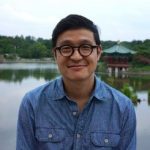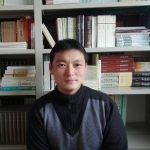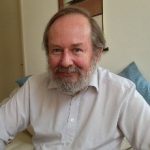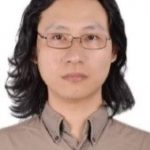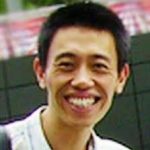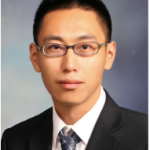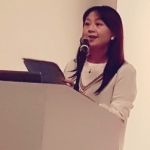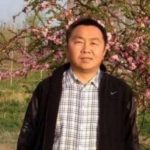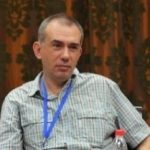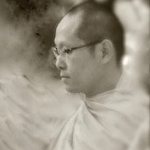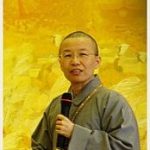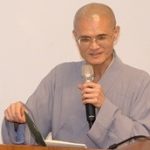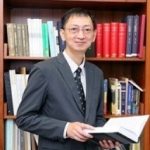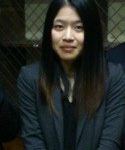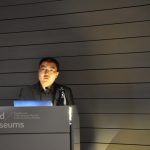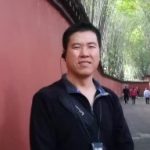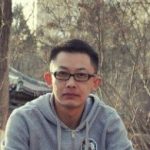Please click here to return to the main conference page.
Lists of Scholars & Biographies︱與會學者名單與簡介
Panelists與會學者名單
Panelists Biographies 研討會發表者簡介
- Juhn Ahn 安俊泳 (University of Michigan)
Juhn Ahn is an Assistant Professor of Buddhist and Korean Studies at the University of Michigan. He studies death, illness, and Buddhism in East Asia. In his doctoral thesis he examined something called the “malady of meditation.” This is a “malady” or “defect” that continued to trouble Buddhist meditators in East Asia for centuries. He was particularly interested in the transformation of this malady or defect over time. In a number of different publications he tried to explain this transformation by situating the changing views of the malady of meditation in their proper historical contexts. He focused specifically on two Buddhist monks who spoke extensively about the malady of meditation: the Chinese Buddhist monk Dahui Zonggao (1089-1163) and the Japanese Buddhist monk Hakuin Ekaku (1686-1769). What drew him to these two towering figures of Chan and Zen is not only the critical role that they played in shaping the discourse about the malady of meditation but also their efforts to use the malady to make sense of problems associated with changing habits of reading among students of Chan and Zen.
His current research focuses on the relationship between Buddhist mortuary practices and elite identity formation in fourteenth century Korea. A small but growing number of families that belonged to the late Koryŏ elite began to abandon Buddhist mortuary practices, which they associated with waste and decadence, in favor of Neo-Confucian mortuary practices and in his recent publications he tries to explain why. Using, among other things, officials histories, biographies, funerary inscriptions, commemorative steles, and literary collections he tries to draw a connection between the rise of this rhetoric of decadence, the gradual shift in the cultural construction of elite identity during the late Koryŏ, and the influx of new social elements under Mongol rule.
- Bai Zhaojie 白照傑 (Shanghai Academy of Social Sciences Institute of Philosophy)
2016.8-今,供職於上海社會科學院哲學研究所,擔任助理研究員,主要研究領域為中古道教、中古佛教、佛道交涉等。
2016.6,於澳門大學獲得哲學博士學位。
其第一部著作《整合及制度化:唐前期道教研究》將由上海人民出版社出版(2018);第二部著作《十字門內飄法雨:澳門當代佛教問題研究》將由香港中文大學人間佛教研究中心負責出版(2018)。其人涉足海外漢學翻譯事業,校譯《中國歷史與社會中的道教儀式》(by John Lagerwey;齐鲁书社,2017);獨立翻譯《李白與中古宗教文學研究》(by Paul W. Kroll;齊魯書社,2017)、《中古道教文學研究》(by Paul W. Kroll;齊魯書社,2018);合譯《文選譯注》(by David R. Knechtges;上海古籍出版社,2019);正在翻譯《政治与般若》(Politics and Transcendent Wisdom by Charles D. Orzech )。此外,其人現擔任《歷代高道傳》項目執行主編,同時承担唐五代道教制度、仙傳和高僧傳說研究等若干著作的撰寫工作。
- H. Barrett 巴瑞特 (SOAS, University of London)
T.H. Barrett is an Emeritus Professor in the Department of Religions and Philosophies at SOAS University of London. His research interests focus on the history of Chinese religion, notably Taoism and Buddhism and pre-modern Chinese history, especially the Tang period.
- Marcus Bingenheimer 馬德偉(Temple University)
Marcus Bingenheimer 馬德偉 teaches in the Department of Religion. He was born in Germany. He obtained an MA (Sinology) and Dr.phil (History of Religions) from Würzburg University and an MA (Communication Studies) from Nagoya University. Marcus currently works as Associate Professor at Temple University, Philadelphia. From 2005 to 2011 he taught Buddhism and Digital Humanities at Dharma Drum 法鼓山, Taiwan, where he also supervised various projects concerning the digitization of Buddhist culture.
His main research interests are the history of Buddhism in East Asia and early Buddhist sutra literature. Currently, he is working on two very different kinds of texts: Āgama literature and Ming-Qing dynasty temple gazetteers. Next to that, Marcus is interested in the Digital Humanities and how to do research in the age of digital information.
- Cao Ling 曹淩 (上海師範大學人文學院)
曹淩,男,上海人。嘗在上海師範大學學習,並獲得博士學位。現任職於上海師範大學哲學與法政學院,任講師職。本人主要從事佛道教關係以及中古宗教儀式的研究,曾經編著《中國佛教疑偽經綜錄》一書,並發表過論文若干篇。
- Chen Jinhua 陳金華 (UBC)
Jinhua Chen is Professor of East Asian intellectual history (particularly religions) at the University of British Columbia, where he also served as the Canada Research Chair in East Asian Buddhism (2001-2011). He additionally held short-term teaching positions at other universities including the University of Virginia (2000-2001), the University of Tokyo (2003-04), and Stanford University (2012).
As recipient of research grants and fellowships from different sources including Social Sciences and Humanities Research Council of Canada (SSHRC), Canada Research Chairs (CRC) Program, Killam Foundation, Peter Wall Institute for the Advanced Studies, Society for the Promotion of Buddhism (Bukkyō Dendō Kyōkai [BDK]), Japan Society for the Promotion of Social Sciences (JSPS), Alexander von Humboldt Foundation and the Max Plank Institute, the Academy of Korean Studies, and most recently, the National Humanities Center (USA), he has been engaged in research projects related to East Asian state-church relationships, monastic (hagio/)biographical literature, Buddhist sacred sites, relic veneration, Buddhism and technological innovation in medieval China, and Buddhist translations. In addition to publishing five monographs, including (1). Making and Remaking History (Tokyo, 1999), (2). Monks and Monarchs, Kinship and Kingship (Kyoto, 2002), (3). Philosopher, Practitioner, Politician: The Many Lives of Fazang [643-712] (Leiden, 2007), 4. Legend and Legitimation: The Formation of Tendai Esoteric Buddhism (Brussels, 2009), and (5). Crossfire: Shingon-Tendai strife as seen in two twelfth-century polemics (Tokyo, 2010), he has also co-edited sevenbooks. He is also the author of over sixty book chapters and journal articles, with major academic journals.
- Deng Xingliang 鄧星亮 (山西大同大學雲岡文化研究中心副教授)
鄧星亮,男,1969年7月出生,湖北省廣水市人。2006年畢業於四川大學中國古典文獻學專業,獲文學碩士學位;2012年畢業於四川大學佛教語言文學專業,獲文學博士學位。現任山西大同大學雲岡文化研究中心副教授、中國俗文化研究所兼職研究員、四川省杜甫學會會員、韓國東亞人文學會會員。近年來,研究領域以佛教文獻與敦煌文獻為重點,主要進行佛教史和佛教典籍等方面的研究。在相關刊物及會議上發表論文多篇,出版著作2部,主持國家社科基金一般項目1項。
- Dong Daxue 董大學 (上海師範大學人文學院)
董大學,男,江蘇宿遷人,歷史學博士。2002—2006年,首都師範大學歷史系歷史學(基地班)本科;2006—2009年,上海師範大學人文學院隋唐五代史專業碩士;2009—2013年,首都師範大學歷史學院歷史文獻學專業(敦煌學方向)博士,師從郝春文教授。2013年起供職於上海師範大學人文與傳播學院,研究領域爲敦煌學、隋唐五代史,已在《文獻》、《敦煌學輯刊》、《華東師範大學學報》等刊物發表專業學術論文十餘篇,目前主要承擔國家社科基金項目“敦煌寫本《金剛經》注疏整理與研究”的研究工作。
- Ji Yun 紀贇 (Buddhist Academy of Singapore)
新加坡佛學院教務主任 / 圖書館館長 / 副教授, 全職。
2006年獲得復旦大學博士學位。博士期間主要從事佛教文獻學的基礎研究,具體研究範圍包括大藏經版本研究、僧人傳記資料整理以及宗教人類學研究,在博士期間完成論文《梁慧皎<高僧傳>研究》(09年度由上海古籍出版社出版)。2006年加入新加坡佛學院從事佛教文獻學、佛教制度史、因明學、巴厘語諸學科之教學研究。除了教書,也於2011年升任教務主任與光明山圖書館館長,協助兼管佛學院教務處及圖書館。
Deputy Dean of Academic / Chief Librarian / Associate Professor, Full-time
JI Yun received his Ph.D. from Fudan University in 2006. During the writing of his doctorate dissertation, his research encompasses the study of Buddhism within the philological studies of Buddhist written texts, collecting of biographical materials of monks and the anthropological studies of religion. Eventually, his dissertation “A Study on the Biographies of Eminent Monks” was published in early 2009.
As a fulltime lecturer of Buddhist College of Singapore, Dr. Ji is now engaged in teaching subjects such as Buddhist Literature, Institution of Buddhist Sangha, Buddhist Logic and Pali language. Dr Ji also assists in overseeing the operation of the college’s Academic Office and the library.
- George Keyworth 紀強 (University of Saskatchewan)
Dr. Keyworth received his B.A. (Honors) in Chinese and Asian Studies and M.A. in Asian Studies from the University of California, Santa Barbara (UCSB). He received his Ph.D. in Chinese Buddhist Studies from the University of California, Los Angeles (UCLA). Dr. Keyworth was an Assistant Professor of East Asian Religions at the University of Colorado at Boulder (CU-Boulder) from 2001-2006, followed by three years as a researcher in Kyoto, Japan, from 2006-2009. In 2011, Dr. Keyworth joined the Department of Religious Studies at the University of Saskatchewan in Canada as an Assistant Professor of Buddhist Studies and East Asian Religions. After receiving tenure in 2017, Dr. Keyworth transferred to the Department of History, where he will teach courses in the areas of premodern Chinese and Japanese history, Asian Studies, the history of religion in East Asia, and comparative manuscript studies.
Dr. Keyworth has developed, taught, and received several teaching awards for more than twenty different undergraduate classes on topics ranging from Asian history to East Asian religious traditions (Buddhism, Confucianism, Neo-Confucianism, Daoism, and Japanese religions) to the academic study of religion. At CU-Boulder, Dr. Keyworth supervised five M.A. students who conducted research on Chinese and Japanese Buddhist studies. He has also supervised five M.A. students at the University of Saskatchewan, who wrote theses on topics ranging from modern religion in China and Japan to early modern Daoism. Dr. Keyworth has received several grants from the Social Sciences and Humanities Research Council (SSHRC) of Canada to support research about and publication of articles on Northern Song dynasty (960-1127) Chinese Chan Buddhism and the figure of Juefan Huihong (1071-1128); Japanese pilgrims to Song China (e.g., Jōjin [1011-1081]); apocryphal Chinese Buddhist scriptures and the particular case of the Shoulengyan jing (*Śūraṃgama-sūtra) using Chinese and Khotanese Sanskrit sources from Dunhuang; esoteric Buddhism in Tang (618-907) and Song China; Zen Buddhism in Edo Japan and the figure of Kakumon Kantetsu (d. 1730); and old Japanese manuscript Buddhist canons, especially from Nanatsudera and the Matsuo shrine canon kept at Myōrenji. Dr. Keyworth is currently working on two books, tentatively titled: Zen and the Literary Arts and Copying for the Kami: A Study and Catalog of the Matsuo Shrine Buddhist Canon.
- Kwak Roe郭磊 (韓國東國大學佛教學術院)
郭磊(KWAK Roe),韓國東國大學佛教學術院研究員,兼任中國五臺山佛教與東方文化國際研究院特邀研究員(2016-2018)。現在負責一項韓國古代佛教文獻的調查、整理項目。畢業於韓國東國大學歷史系佛教史專業,研究方向是東亞佛教史。博士論文《新羅五臺山文殊信仰研究》,在此基礎之上持續探討東亞佛教史上的諸問題。關注中國與韓國日本的中古佛教史交流。
曾發表《義相的華嚴思想與中國佛教》、《韓國密教略考》、《新羅佛教的密教特質》、《新羅慈藏參五臺山之考辯》等數篇有關中韓佛教關係的論文。
- Lin Pei-ying林佩瑩 (輔仁大學)
Pei-ying Lin is Assistant Professor at Fu Jen Catholic University, Taiwan. Her research interests are Chan Buddhism, Bodhisattva precepts and rituals, and medieval Buddhist travelers. She studied at National Taiwan University (BA, 2002), Cambridge University (MPhil, 2006), and the School of Oriental and African Studies, University of London (PhD, 2012). Her thesis brought together a wide range of documents from ninth-century China, Japan and Korea, and cross-culturally examined the relationship between patriarchal lineages versus textual transmission at the early stage of the history of Chan Buddhism. Before joining Fu Jen University, as the Sheng Yen Foundation Postdoctoral Fellow in Chinese Buddhism (2015-2016) at Berkeley, she has been working on a project involving a group of eighth-century precept manuals, analyzing the doctrinal and historical connections between Chan Buddhism and Esoteric Buddhism during the Tang dynasty, with a focus on the commonality of their key components of precepts and meditation.
林佩瑩: 台灣輔仁大學助理教授,研究領域為唐代佛教,側重文獻與思想的傳遞,涵蓋議題涉及禪宗、菩薩戒文獻、文化交流與認同等。她於台灣大學取得政治系國際關係組學士學位,於英國劍橋大學進修碩士學位,並於倫敦大學亞非學院獲得宗教學博士。加入輔仁大學宗教學系的教學團隊之前,她於加州伯克利從事中國佛教的博士後研究,以一套唐代中葉的菩薩戒戒本作研究主題,分析禪宗與密教在大乘戒律與禪修上的關聯性。
- Niu Hong牛宏 (上海師範大學)
牛宏(1972—),博士,教授。2009—2010年,在英國倫敦大學亞非學院(SOAS)作訪問學者一年。主要研究領域為藏傳佛教文獻與思想、漢藏佛教關系。出版著作《章嘉宗義研究》,發表論文二十余篇,主持教育部人文社會科學研究項目《敦煌藏文禪宗文獻的整理、翻譯與研究》等。
- Mario Poceski 伯理奧 (University of Florida)
Mario Poceski, a full professor of Buddhist studies and Chinese religions at the Religion Department, University of Florida, received a PhD in East Asian Languages and Cultures, with specialization in Buddhist studies, from the University of California, Los Angeles (2000). He has spent extended periods as a visiting researcher at Komazawa University (Japan), Stanford University, the National University of Singapore, and the University of Hamburg (Germany), and has received several prestigious fellowships, including an Alexander von Humboldt Research Fellowship (for senior researchers). Poceski’s most recent books are The Records of Mazu and the Making of Classical Chan Literature (Oxford 2015), The Wiley Blackwell Companion to East and Inner Asian Buddhism (Blackwell 2014, ed.), Introducing Chinese Religions (Routledge 2009), and Ordinary Mind as the Way: The Hongzhou School and the Growth of Chan Buddhism (Oxford 2007). His publications also include two other books and numerous articles and chapters on various aspects of Buddhist studies.
- Grzegorz Polak 波拉克 (Maria Curie Sklodowska University in Lublin, Poland/DILA)
2009 PhD in Philosophy, Thesis: Reinterpreting Jhāna: Towards a Critical Reconstruction of Early Buddhist soteriology, Faculty of Philosophy and Sociology, Maria Curie Skłodowska University in Lublin.
2006 MA in Philosophy, Thesis: Droga do wyzwolenia w traktacie Visuddhimagga Buddhaghosy (The Path to Liberation in Buddhaghosa’s Vissudhimagga), Faculty of Philosophy and Sociology, Maria Curie Skłodowska University in Lublin.
- Phra Kiattisak Ponampon釋智譽 (Cambridge University)
Phra Kiattisak Ponampon 釋智譽 received his BA in Religious Studies from Hsuan Chuang University, Taiwan (with a thesis on Buddhist Stupa), one MA degree (in Religious Studies) from University of Otago (New Zealand), with a thesis titled “Mission, Meditation and Miracles: An Shigao in Chinese Tradition,” and another MA degree (in Buddhist Studies) from SOAS, UK, with a dissertation titled “Meditative Techniques and Visionary Experiences in Early Medieval Chinese Buddhist Texts.” He is currently working on his MPhil in Chinese Studies at the University of Cambridge. His Research Interests cover Dunhuang Studies,Silk Road Studies, Chinese Buddhism, Early Medieval Chinese Buddhist Meditative Techniques, Taoist Meditation, Early Buddhist Manuscripts, and Buddhist Art.
- Jason Protass 蒲傑聖 (Brown University)
Jason Protass (Ph.D., Stanford) specializes in Chinese Buddhism of the Northern and Southern Song dynasties (960-1279). His current book project, tentatively titled “The Poetry Demon,” examines Buddhist monks’ self-understanding of religious occupation and poetic composition in the tenth to thirteenth centuries CE.
Jason’s other projects include a study of Chan monks’ shifting geographic distribution during the Northern Song dynasty. In this second project, Jason weaves together canonical and extra-canonical sources to create a spatial history of practices. As this project develops, he will be working with materials related to hagiography, itinerancy, epistles, gazetteers, literati Buddhism, and occasional writings.Jason has studied at Academia Sinica (Taipei), Hanazono University (Kyoto), Ryukoku University (Kyoto), and Peking University (Beijing) under the auspices of fellowships from Fulbright Taiwan, American Council of Learned Societies, Bukkyō Dendō Kyōkai (Japan), and the Ministry of Education P. R. China. Jason welcomes students interested in Buddhism across East Asia.
- James Robson 羅柏松 (Harvard)
James Robson is Professor of East Asian Languages and Civilizations. He is the Director of Undergraduate Studies, East Asian Studies, and has served as Director of Graduate Studies for the Regional Studies East Asia M.A. program. He teaches East Asian religions, in particular Daoism, Chinese Buddhism, and Zen, as well as the sophomore tutorial for concentrators. Robson received his Ph.D. in Buddhist Studies from Stanford University in 2002, after spending many years doing research in China, Taiwan, and Japan. He specializes in the history of medieval Chinese Buddhism and Daoism and is particularly interested in issues of sacred geography, local religious history, talismans, and Chan/Zen Buddhism. He has been engaged in a long-term collaborative research project with the École Française d’Extrême-Orient studying local religious statuary from Hunan province. He is the author of Power of Place: The Religious Landscape of the Southern Sacred Peak [Nanyue 南嶽] in Medieval China (Harvard, 2009), which was awarded the Stanislas Julien Prize for 2010 by the French Academy of Inscriptions and Belles-Lettres and the 2010 Toshihide Numata Book Prize in Buddhism. Robson is also the author of “Signs of Power: Talismanic Writings in Chinese Buddhism” (History of Religions 48:2), “Faith in Museums: On the Confluence of Museums and Religious Sites in Asia” (PMLA, 2010), and “A Tang Dynasty Chan Mummy [roushen] and a Modern Case of Furta Sacra? Investigating the Contested Bones of Shitou Xiqian.” His current research includes a long term project on the history of the confluence of Buddhist monasteries and mental hospitals in Japan.
- Shi Guo-Jing 釋果鏡 (DILA)
最高學歷:日本佛教大學文學博士
職 稱:副教授、禪文化研修中心主任
專 長:中國禪學、中國淨土學、漢傳佛教史、日語文
- Shi Guo-Huei 釋果暉 (DILA)
最高學歷:日本立正大學文學博士
職 稱:副教授、佛教學系主任
專 長:禪學、漢譯禪經研究、安世高研究
- Teng Wei-jen 鄧偉仁 (DILA)
Prof. Wei-jen Teng currently teaches at Dharma Drum Institute of Liberal Arts, Taiwan. He completed his BA degree in Pali and Theravada Buddhism at University of Kelaniya, Sri Lanka, MA in Sanskrit at University of Poona, India. He then enrolled in another MA program in Religious Studies at University of Chicago, and lastly received his Ph.D. in Religious Studies at Harvard University. Prof. Teng’s research interests include Buddhist Theory of Mind and Meditation, Intellectual History of Chinese Buddhism, and more recently Buddhism and modernity.
鄧偉仁教授目前任教於台灣法鼓文理學院。他本科畢業於斯里蘭卡肯那尼亞大學巴利文暨佛學系,碩士是印度普納大學的梵文學研究所,以及美國芝加哥大學神學院的宗教學研究,並且於2011年於哈佛大學宗教學研究取得博士學位。他的研究興趣包括宗教研究方法與理論、漢傳佛教思想史、佛教禪修理論、巴利文佛教、古典梵文文法以及當代佛教與現代性相關議題。
- Barend J. ter Haar田海 (Oxford)
Barend J. ter Haar teaches Chinese studies at the University of Oxford, with a strong focus on cultural and religious history. Although first of all a social and cultural historian, the religious dimension is so central to Chinese traditional life that much of his research up to now has dealt with religious phenomena. In addition, he has worked extensively on issues of ethnic identity, violence and fear, and social organization. An important concern of his is to demonstrate that traditional culture and cultural patterns are still relevant today, as becomes visible for instance in the case of the Falun Gong or the ongoing role of exorcist violence in political contexts throughout the twentieth century. For those who read Dutch, he has published a history of China, entitled The Heavenly Mandate: The history of the Chinese Empire until 1911 or Het Hemels Mandaat: De Geschiedenis van het Chinese Keizerrijk (AUP: Amsterdam, 2009) with a somewhat revisionist view on the Chinese past. His book on the lay Buddhist group called the Non-Action Teachings (late 16th century to the present) has come out with Hawai’i University Press, as Practicing Scripture: A Lay Buddhist Movement in Late Imperial China.
- Wang Ching-wei 王晴薇 (新加坡漢傳佛學院/臺灣中華佛學研究所)
Wang Ching-wei is current the Provost at the Institute of Chinese Buddhism, (from 2017-Present) and an Associate Research Fellow at Chung-hwa Institute of Buddhist Studies,中華佛學研究所 (from 2016-Present). She received her PhD in East Asian Studies at University of Arizona. Her research areas include:
- Mahāyāna Sūtras and Mahāyāna Samādhi Practices 大乘經典與三昧
- Meditation in Chinese Tiantai and Chan traditions 天台止觀及禪學
- Buddhist Iconography 佛教圖像學
- Teaching Chinese Culture in an Intercultural Context 對外文化教學
- Teaching Chinese as a Second Language 對外漢語教學
- Albert Welter 魏雅博(University of Arizona)
Albert Welter’s area of academic study is Chinese Buddhism, and he has published in the area of Japanese Buddhism as well. His main research focuses on the study of Buddhist texts in the transition from the late Tang (9th century) to the Song dynasty (10th-13th centuries). In recent years, he has published Monks, Rulers, and Literati: The Political Ascendancy of Chan Buddhism (Oxford, 2006), The Linji lu and the Creation of Chan Orthodoxy: The Development of Chan’s Records of Sayings Literature (Oxford, 2008), and Yongming Yanshou’s Conception of Chan in the Zongjing lu: A Special Transmission within the Scriptures (Oxford, 2011), in addition to numerous articles. His work also encompasses Buddhist interactions with Neo-Confucianism and literati culture. He is currently finishing a project on the social and institutional history of Buddhism as conceived through a text compiled in the early Song dynasty, Zanning’s Topical History of the Buddhist Clergy, to be published by Cambria Press in 2018. Stemming from this latter research interest, Professor Welter has also developed a broader interest in Chinese administrative policies toward religion, including Chinese notions of secularism and their impact on religious beliefs and practices, leading to a co-edited volume (with Jeffrey Newmark), Religion, Culture, and the Public Sphere in China and Japan (Palgrave-Macmillan, 2017). He recently received funding from the Khyentse Foundation for a project, “The Hangzhou Region and the Creation of East Asian Buddhism,” in conjunction with Zhejiang University, the Hangzhou Academy of Social Sciences, and the Hangzhou Buddhist Academy. He also received funding from the American Council of Learned Societies (with the support of the Chiang Ching-kuo Foundation) for an international conference, “Creating the World of Chan/ Sŏn /Zen: Chinese Chan Buddhism and its Spread throughout East Asia.” Before coming to the University of Arizona, Dr. Welter was based in Canada, where his research projects were regularly supported by the Social Sciences and Humanities Research Council of Canada.
- ZhangChao 張超 (East Asian Civilisations Research Centre (CRCAO/CNRS, Paris)
Dr. Chao Zhang holds a PhD in Historical and Philological Sciences from the École Pratique des Hautes Études (Paris, 2014). Her thesis explored a group of pre-modern Chinese Buddhist historiographies commonly called “Chan Miscellanea” (chanlin biji). She is currently a postdoctoral fellow at the East Asian Civilisations Research Centre (Paris) and a JSPS foreign researcher at Komazawa University (Tokyo). Her research revolves around themes such as Chan/Zen historiography, the religious practice of local Song elites, and the reception of Chinese writings in medieval Japan.
- Zhang Shubin 張書彬 (浙江大學漢藏佛教藝術研究中心 )
現為浙江大學漢藏佛教藝術研究中心博士後、助理研究員。
中國美術學院美術史博士(2017)。
研究領域:
涵蓋但不限於中國美術史、佛教美術、視覺文化與中外美術傳播研究等。
致力於關注宗教與文明進程的聯繫,佛教與政治、宗教與藝術的關係。
獲獎記錄:
曾獲第二屆“星·藝術史”論文獎、佛教與東亞文化國際青年學者論壇“優秀論文獎”、“博士生國家獎學金”、“第二屆民生藝術史論文獎”、第十一屆潘天壽獎學金等。
著作:
《正法與正統:五臺山佛教聖地的建構及在東亞的視覺呈現》、
《文本、圖像與儀軌——唐宋之間敦煌地藏信仰的圖像研究》
《神聖空間的建構與複製——以中古時期“文殊-五臺山”信仰在東亞的傳播為中心》
《神聖導引與視覺朝聖:敦煌莫高窟第61窟<五臺山圖>的時空邏輯》
《五台靈石與文殊七尊像:日本比叡山文殊樓的營建及相關問題探究》
- <Zhao Yanlin 趙燕林 (敦煌研究院考古研究所館員)
甘肅省甘谷縣人,碩士研究生學歷,現任敦煌研究院考古研究所館員。致力於佛教藝術與石窟考古研究工作。
出版、發表有:
《蘭州黃河大水車》, 2009年4月,甘肅人民美術出版社;
《耿家臉譜》,2013年11月,敦煌文藝出版社;
《蘭州刻葫蘆》,2015年2月,甘肅人民出版社。
《莫高窟三兔藻井圖像來源考》,《藝術探索》2017年第3期;
《莫高窟_三兔藻井圖像釋義》,《西北民族大學學報-社科版》2017年第5期。
- Zhu Xiaofeng 朱曉峰 (敦煌研究院博士後科研工作站在站博士後)
畢業于蘭州大學,音樂學碩士,敦煌學博士,副研究館員,現為敦煌研究院敦煌學博士後科研工作站在站博士後,中國音樂圖像學會理事。主要論著有《唐代莫高窟壁畫音樂圖像研究》《壁畫音樂圖像與社會文化變遷》《彈撥樂器流變考》《<張議潮統軍出行圖>儀仗樂隊樂器考》等。

